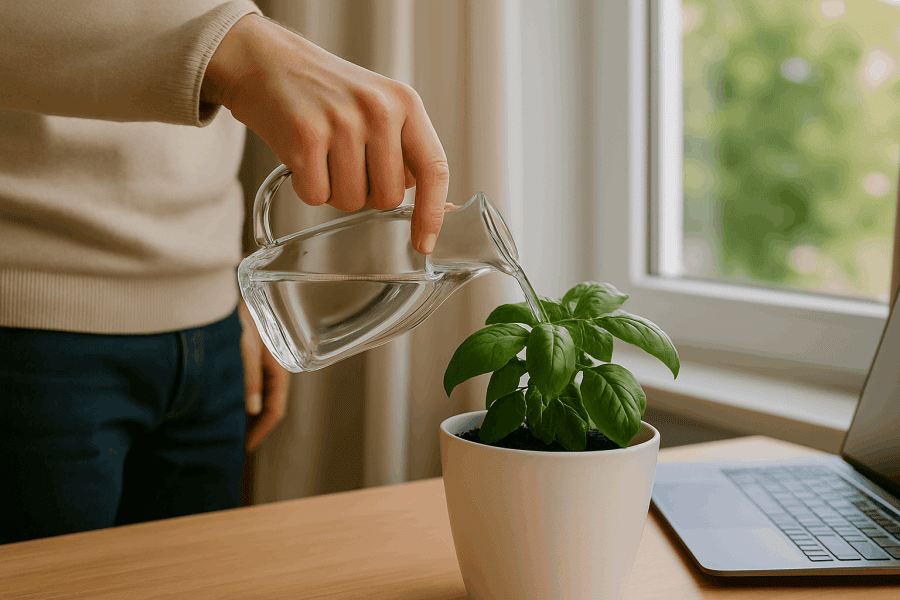1. Start the Day Without Your Phone
No, you don’t have to throw it out the window.
But you can reclaim your first five minutes.
Leave your phone on airplane mode or outside the bedroom. Instead of diving into notifications and noise, sit up slowly. Stretch. Breathe.
Drink a glass of water. Think one kind thought about the day.
That micro-habit alone sends a clear signal: you come first.
Not the news. Not the inbox. You.
You don’t need an hour-long morning routine to change your day—just a minute of intention.

2. Touch Something Alive
That plant you’ve been forgetting to water? Say hello to it.
Take your coffee outside. Open a window and look at the sky.
In a hyper-digital life, this one habit grounds your nervous system in seconds. Touching, noticing, or even silently naming something natural reconnects you to your body and to now.
Nature doesn’t have to be a forest. It can be your balcony basil.

3. One Full Breath Before You Hit “Send”
Pause.
Before you reply, before you post, before you “just get this out of the way”-take one slow inhale. Hold. Exhale.
It’s barely five seconds, but this one breath can stop you from reacting on autopilot. It reintroduces choice.
Over time, this micro-habit builds a stronger connection to your words, your boundaries, and your presence.
A single breath can change not just what you say, but how you feel saying it.
4. Put Something Away- On Purpose
Not “clean the whole kitchen.” Just… one thing.
Fold the hoodie instead of tossing it. Close the drawer you left open. Return the mug to the sink.
You’re teaching your brain: we finish things.
It’s less about the object and more about identity. You become the kind of person who handles small things. And that’s powerful.
Order isn’t perfection-it’s an act of self-respect.

5. Notice One Good Thing
At the end of the day- don’t journal.
Don’t write three pages or make it a big ritual (unless you want to).
Just whisper or think of one sentence: “The sun looked nice on my walk.”
“I made someone smile.”
“That coffee hit different.”
The brain is wired to scan for danger. This habit rewires it-gently-for joy.
One sentence a day. That’s all it takes to start shifting the narrative.

6. Name What You’re Feeling-Without Fixing It
Emotions don’t need to be solved.
They want to be noticed.
Once a day, pause and quietly name what’s happening inside:
Tired. Restless. Hopeful. Tight in my chest. Kind of proud.
No judgment. No action plan.
This habit builds emotional literacy-and that’s the foundation for better choices, deeper relationships, and real resilience.
If you can name it, you don’t have to be ruled by it.
7. Reset Your Posture
Don’t overthink it.
When you stand up, just roll your shoulders back and lift your head.
That’s it.
This micro-move signals your brain: I’m alert. I’m capable.
It doesn’t matter if you’re home alone or in a boardroom. Changing your posture changes your presence.
Your body tells the story-whether you mean it to or not.

Final Thought: Small Is Not the Opposite of Powerful
We live in a world obsessed with extremes-go big, change fast, fix everything now.
But the quiet truth is: transformation starts with what you do on a Tuesday at 3pm, without an audience, without a milestone, and without a big plan.
That glass of water.
That breath before “send.”
That small choice that says: I matter enough to try.
You don’t need to do them all.
Pick one.
Repeat it.
Let it shift the way you relate to yourself. The rest will follow.
Still wondering how to make micro-habits work for you? Here’s what people often ask:
Do micro-habits really make a difference?
Yes. When done consistently, small actions compound. They create new neural pathways, reinforce identity, and change how you show up daily.
How do I make a micro-habit stick?
Anchor it to something you already do—like drinking coffee or brushing your teeth. Keep it simple, repeatable, and emotionally rewarding.
What’s the best time to start a new habit?
Now. You don’t need Monday or a new month. One intentional action today is enough.
How long does it take to see results?
Some shifts are instant (like a deep breath). Others take weeks. But with micro-habits, the win is in the showing up—not just the outcome.
What if I forget?
That’s okay. Habits aren’t ruined—they’re resumed. One missed moment doesn’t cancel your progress.
